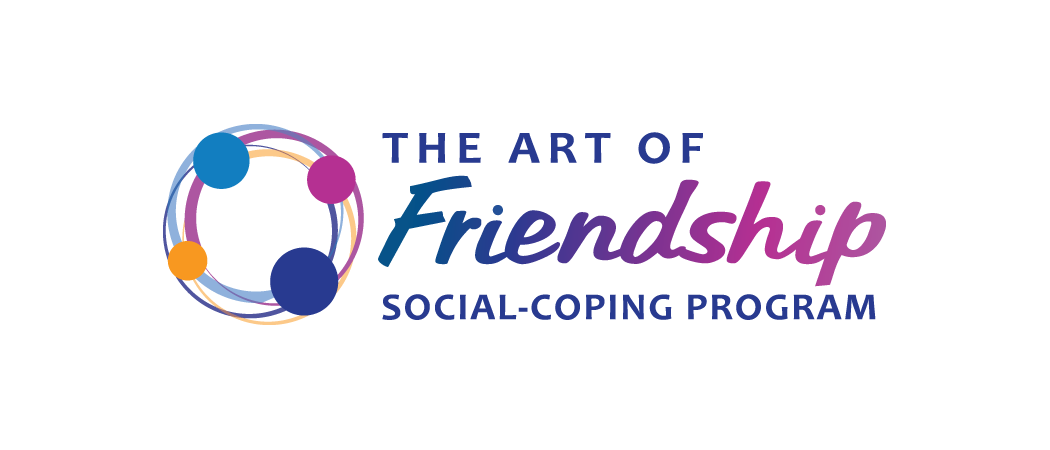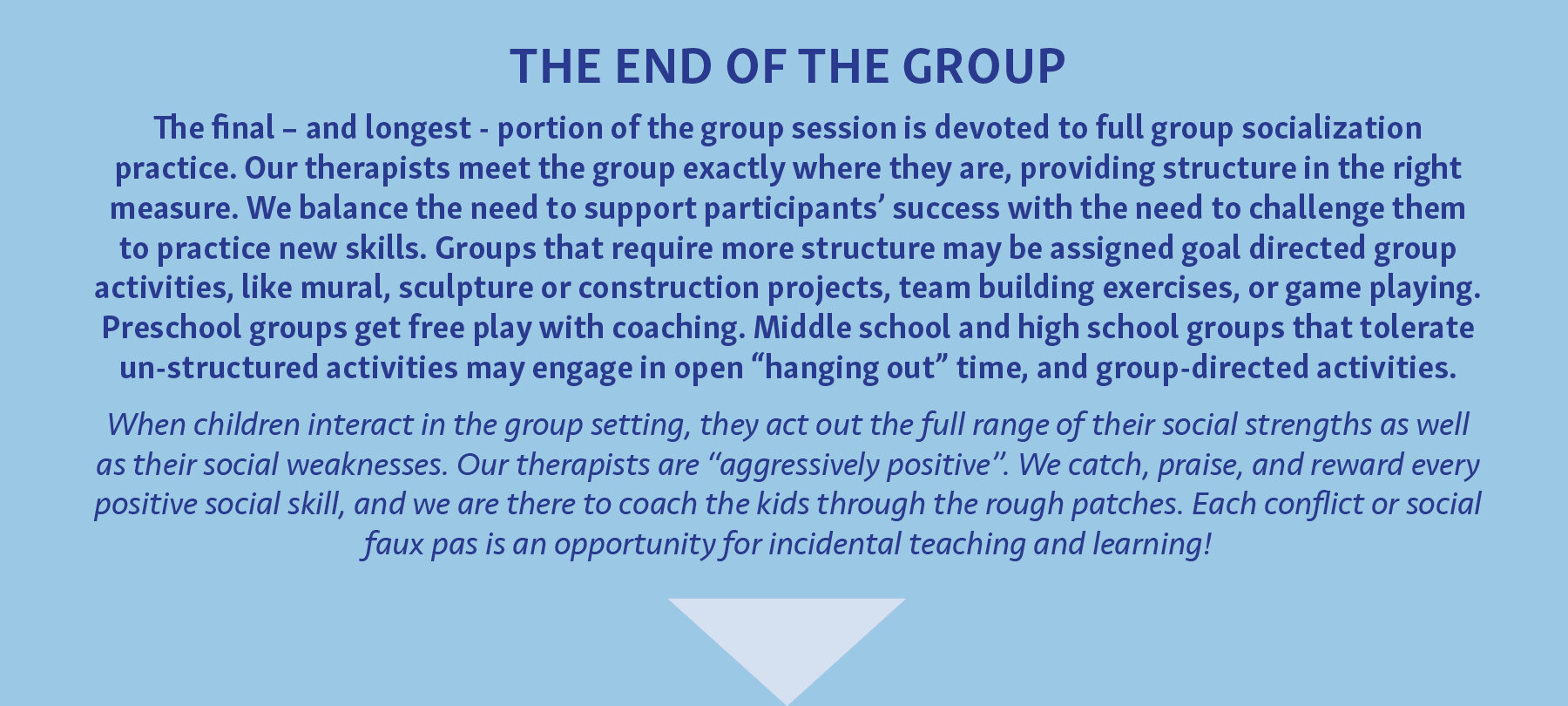
Program Description
No one does social skills quite like us!
Read this page to learn about:
Our typical group members are girls and boys between 4-19 years old with Social Emotional Cognitive Challenges (S.E.C.C.s). S.E.C.C.s are cognitive skill gaps in which a child may misread social cues, struggle to infer the unwritten social rules, or process the world in a neurodiverse way such that socializing and staying emotionally-behaviorally regulated is difficult.
Our clients are intelligent and verbal children who grapple with social and emotional challenges with peers in a variety of ways:
Hard time making and keeping friends
Misreading social cues such as body language or voice inflections
Shyness and social awkwardness
Difficulty initiating and/or sustaining conversation or play
Inflexibility and arguing with peers
Misunderstanding when it is necessary to give up control and compromise
Frustration tolerance and anger management transitions, anxiety, impulsivity, etc.
Difficulty navigating unstructured situations
Experienced bullying
The Art of Friendship specializes in helping children with diagnoses of ADHD, Mild Autism, Social (Pragmatic) Communication Disorder, learning differences, and anxiety. We also work with children WITHOUT diagnoses who struggle with social skills issues just the same. All of our groups are “high functioning”, but each child and group have unique needs. We are committed to placing children in groups with appropriate peers for maximum comfort and success. Additionally, the curriculum is highly cognitive, teaching awareness and skills; therefore children with low average-average I.Q. and higher most benefit from the direct instruction.
The Art of Friendship program might not benefit some children. Those with a significant self-regulation challenge (extreme physical aggression, frequent and uncontrolled tantrums or a tendency to run away) or those overly preoccupied with maintaining control (completely uncooperative, blocking the group from functioning) would probably not flourish in the group setting. We recommend a course of individual therapy prior to entering the group therapy setting. Lastly, the child with borderline intellectual functioning or intellectual developmental disorder (intellectual disability) may not get the most out of the program because they may struggle to connect with and retain the cognitive-based social-coping lessons.
At Art of Friendship, we must ensure that our groups are successful for the entire group as well as your child individually. During the intake process we may recommend or dis-recommend a group in our program for your child. We do so with care and consideration for the success of the individual and the group, and without discrimination based on race, background, or gender/sexual identity, Sometimes, an enrolled child develops unexpected behaviors that impact the group’s functioning. In those cases, we might observe behaviors that are disruptive, oppositional, tantrum, or hurtful. Our therapists are skilled and diligent in our attempts to support and resolve these challenges. At times, all the attempts to support the child’s emotions and behavior don’t result in success in the context of the group setting and we may need to discontinue your child’s attendance in the group or the program. In that unfortunate situation, we will try to offer alternative group or individual interventions that might be of more benefit to your child.

The Art of Friendship (AoF) social skills curriculum differs from all others. It is complex social awareness made simple, it is social decision-making made visual and concrete, and it is memorable language designed for easy collaboration by all the supportive adults in a child’s life. Most importantly, it is PLAYFUL and FUN.
AoF was developed and honed through research, collaboration with parents, and experience with hundreds of children with Social-Emotional Cognitive Challenges. The Art of Friendship is a social cognitive-behavioral therapy approach. AoF teaches children how to THINK THROUGH social situations and how to SELECT THE BEST POSSIBLE SOCIAL BEHAVIOR to fit in and have fun with others. It teaches children of all ages the cause and effect relationship between their behavior and peers’ reactions. Children learn and practice the self-awareness, awareness of others, and self-control to craft the reputation and friendships they desire (and deserve).
The real secret of the Art of Friendship curriculum is that it is visual and active. Pictures are truly worth a thousand words! In the Art of Friendship curriculum it is the THERAPIST who creates precise metaphors and images that are deeply registered and internalized by our young clients. Role play and informal social practice are reinforced with a motivating reward system. The image and its catch-phrase become a rallying cry and a handy reminder in session and at home and school. The objective: for your child to generalize each new social skill throughout his or her world.
Art of Friendship curriculum includes:
Theory of Mind: understanding and accepting that everyone has a different mind
Recognizing social cues: understanding others’ feelings and needs
Taking others’ perspective: predicting others’ feelings, needs, and motivations
Social cause and effect: linking one’s behavior to others’ reactions
Fitting in: thinking through each social situation and selecting the best possible social response
Big picture thinking: compromising to keep relationships and group activities fun and functional
Flexibility: adjusting behaviors to keep relationships comfortable & functioning
Self regulation and coping with feelings and impulses: cognitive behavioral coping skills are taught to relieve frustration, anger, and anxiety
How-to strategies for every social situation under the sun: scripts, tips, plans, and schemes for play, conversation, unstructured time, difficult peers, bullies, classroom situations, family gatherings, and everything in-between!
The A.R.C.H. Method of Social-Coping Skills Training
Over more than two decades of development and implementation at the Art of Friendship, Camp Pegasus, and clients’ homes, we originated the comprehensive A.R.C.H. method of training social and coping skills *. A.R.C.H. stands for:
Anticipate & Teach – Accurately assess the social and self-regulation gaps in a child’s profile. Then, provide direct instruction in Cognitive-Behavioral Social-Coping skills to build the child’s ability to manage each challenge. Structure such as visual schedules and rule/expectation lists are additional proactive training tools.
Reinforce – Create positive cycles. Provide real time feedback recognizing children’s positive social behaviors that motivate repetition and practice of social-coping skills. We use “Targeted Positive Reflection”, Success-Oriented Instructions, and a Power Struggle-Free Policy, emphasizing the Culture of Readiness.
Compassionate Social Coaching - Gently help participants learn from challenging moments and social miscues by asking reflective questions. Our questions (“Jeopardy Therapy”) give the child the gift of thinking through their role, taking others’ perspective, examining the consequences of their actions, and problem-solving in real time. We teach children the thought process to independently reconsider their unhelpful thoughts and behaviors and to select positive replacement behaviors.
Holding Environment – Strategically utilize positive behavior reinforcement and natural social consequences to dramatize and “over-teach” desired social skills. When consulting with parents and schools, we have at our disposal a range of reward/consequence strategies to decrease negative behaviors and shape positive social and coping behaviors.
* For a complete description of the A.R.C.H. method and how to use it with your child, check out Mike Fogel’s book, “The Social-Emotional Guidebook: Motivate Children with Social Challenges To Master Social & Emotional Coping Skills”. Click here to visit the “Guidebook” page on this site.
Fun reward system for social skills training

Our therapists look to catch and praise every positive social behavior in group. We offer targeted praise along with tokens that help our clients understand exactly which behavior was helpful. Our prime objective is to get the kids to repeat and REPEAT positive social skills until they become new habits. Participants 14 and under save up as many tokens as possible and trade them in for prizes.
The AofF reward system strives to create new levels of self-awareness and self-control. Participants have extra-external motivation to think and act socially. They develop the motivation to use new coping and communication skills to manage emotions and impulses.
The CATCH-PRAISE-REWARD system focuses on ELICITING positive social and coping behaviors. When children practice and repeat positive replacement behaviors, many of their old, less helpful habits disappear!
Real-time feedback and social coaching
Just as we catch and praise participants’ STRENGTHS, we are equally prepared to handle the difficult moments, too. We view social conflicts and mess-ups as opportunities for skill development. If someone is upset we first teach and reinforce calming down strategies. We provide empathy and compassion for the painful parts of the process.
Our therapists do not respond punitively or with frustration when conflicts occur. Instead, we stop the group process and have the group engage in a problem-solving technique. We emphasize perspective-taking, empathy, and communication. Everything is connected to social thinking.
Children’s brains are in continuous growth and development. When children are exposed to activities that stimulate the brain, their brain grows new and more efficient connections. Therefore, when our clients practice and repeat positive social behaviors with peers, they are strengthening their social-thinking pathways in their brains. We simply want our group members to repeat and practice…Repeat and Practice…REPEAT AND PRACTICE!











